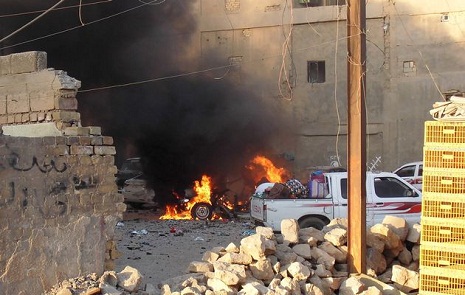Iraqi Prime Minister Haider al-Abadi y Sunday ordered the controversial Iranian-backed militias to join the fight to take back control of the city from the Islamic militants. U.S. officials have expressed concern over the divisive and increasingly powerful Iranian-backed Shiite groups.
The fall of Ramadi Sunday represented a huge victory for the Islamic State, dealing a profound blow to Iraq’s U.S.-backed government and its military campaign to drive the extremist group out of the war-ravaged country. Just 24 hours before, officials in Baghdad announced that military reinforcements had been dispatched to defend the city, in Iraq’s largest province, against a brutal assault that began Thursday.
But by Sunday, even the roads to Baghdad, 80 miles to the east, appeared vulnerable to the militant advance.
“Ramadi is now entirely under the control of Daesh,” said Ahmed al-Salmani, a member of parliament who represents Anbar province. Daesh is the Arabic acronym for the Islamic State.
Sunday’s developments, including Abadi’s decision to deploy Shiite militias to the country’s Sunni heartland, could complicate the U.S.-led campaign targeting the extremist group. In recent days, that campaign has included American airstrikes against militant positions in Ramadi. Washington has expressed worry over deploying the irregular, but powerful militias backed by Iran.
Abadi’s announcement on state television Sunday evening, which contained few details, also included a plea for pro-government forces not to abandon their positions in Anbar.
The force of about 400 police officers under Alwani’s command also retreated in their vehicles to the east, he said. Islamic State fighters besieged them on every road, forcing them to abandon the vehicles and escape on foot. A military convoy from the al-
Habbaniyah air base later retrieved the fleeing Iraqi forces, he added.
“The retreat was complete chaos. There was no organization,” Alwani said, describing attacks by “hundreds” of Islamic State militants.
Earlier in the day, militants posted an Islamic State statement on social media that described Sunday’s events as a major military success, saying that the group “had imposed its control over all of Ramadi.”
In Mosul, Iraq’s second-largest city, which the Islamic State has controlled since June, fighters fired automatic weapons into the air and passed out candy in an impromptu street celebration, according to a resident in the city. He spoke on the condition of anonymity, citing concern for his safety.
“The streets are full of cars honking horns and shouting Allahu Akbar because of Ramadi,” he said in a Facebook message.
The prime minister’s order to Shiite militias came hours after Anbar’s provincial council voted in favor of allowing the irregular forces — known by the government as “popular mobilization units” — to participate in the battle to retake the city.
“We took this decision because we have nowhere else to turn. We’ve literally lost everything,” said Kahtan Abed, assistant to the provincial council’s head, Sabah Karhout.
Iraqis, particularly in Sunni-dominated Anbar, are wary of the militias and the Shiite-led government in Baghdad, the capital. The Islamic State has capitalized on Sunni grievances to take control of most of Anbar.
Diplomats, analysts and some Iraqis say that the militias threaten to undermine Iraq’s government as well as delicate sectarian relations in the country. With aid from Shiite Iran, the militiamen carried out scores of attacks against American soldiers during the Iraq war. But more recently, the militias have proved to be a crucial force in retaking territory, including the city of Tikrit last month, from the Islamic State.
More about:
















































